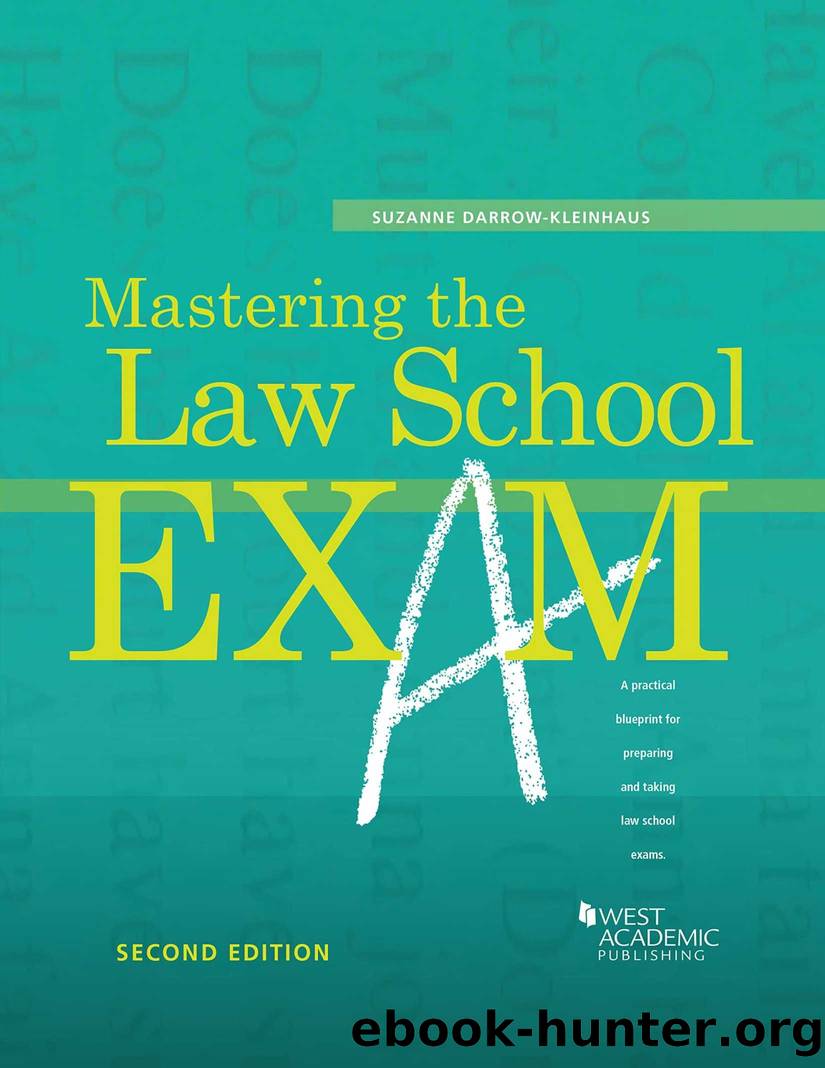Mastering the Law School Exam by Suzanne Darrow-Kleinhaus

Author:Suzanne Darrow-Kleinhaus
Language: eng
Format: azw3
ISBN: 9781634592253
Publisher: West Academic Publishing
Published: 2023-01-18T00:00:00+00:00
C.IS THE PROBLEM THE WAY YOU WRITE?
The answer to this question is very likely âno.â The problem is not your writing, or what you really mean, your style of writing. Still, my experience in working with students is that you tend to think it is.
For example, letâs consider what this student had to say on her own behalf. What strikes me, and should strike you, is that she minimized the importance of leaving âstuffâ out of her answer in favor of finding fault with her writing. Of course, the âstuffâ weâre referring to is the law and legal analysisâthe essence of any answer.
Instead, the student identifies writing as the weakness and dismisses the real problems with conclusory statements and insufficient and incomplete statements of the law. While to the novice this seems to be a writing problem, itâs not. Itâs a legal analysis problem and an overall failure to engage in an IRAC-based analysis. But before we target these specific deficiencies, letâs discuss the rather widely-held belief that âthe problem is my writing.â
Thereâs good news and thereâs bad news when it comes to the writing issue. The good news is that most of you donât have a problem with basic writing skills. Consequently, when a professor makes the comment on your exam that âyou have a problem with writing,â itâs not likely to be referring to matters of subject-verb agreement, displaced modifiers, or too many commas (while grammar problems are definitely something you need to work on and improve, in general these are not the problems which seriously detract from your grade), but rather, it concerns the substance of what youâre saying and the structure in which you are saying it.
Therefore, the comment
âThe problem is your writingâ
more likely translates to
âYour analysis is disorganizedâ
or possibly
âYour discussion lacks substanceâ
or maybe even
145
âYour argument lacks focusâ
As you can see, these comments go well beyond the mechanics of writing to the structure and content of what youâve written. And hereâs the bad newsâthis is far more serious than grammar problems and requires a great deal more work. But first it requires that you give it the recognition it deserves.
Back to the good newsâyou can correct these deficiencies once you realize that they canât be dismissed as âwriting problems.â I have no doubt that youâd much rather have learned that the problem was simply a matter of punctuationâof knowing where to put the commas and suchâbut itâs not. Rather, itâs a matter of how youâre thinking about the problem and how youâre putting it down on paper. All of which pretty much brings us full circle to where we began our analysis of the second hypotheticalâwhere your answer is disorganized. Frequently, organizational problems masquerade as writing problems and are easily mis-diagnosed.
Once again, consider what happens when your answer is disorganized. As weâve seen, there may be any one or a mix of the following: identifying one issue but discussing the rules for another, lumping all the issues in the problem together in one paragraph and then
Download
This site does not store any files on its server. We only index and link to content provided by other sites. Please contact the content providers to delete copyright contents if any and email us, we'll remove relevant links or contents immediately.
